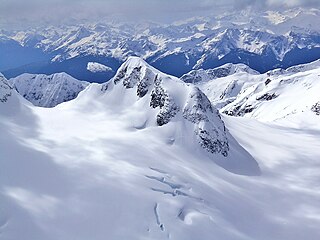
Mount Spetch is a 2,579-metre (8,461-foot) mountain summit located in the Coast Mountains, in Joffre Lakes Provincial Park, in southwestern British Columbia, Canada. It is part of the Joffre Group, which is a subset of the Lillooet Ranges. It is situated 25 km (16 mi) east of Pemberton, midway between Mount Matier and Slalok Mountain, both one kilometre either side of Spetch. The mountain's name was submitted by Karl Ricker of the Alpine Club of Canada to honor Samuel W. Spetch, who operated the general store at Birken, and other businesses in Pemberton. The name was officially adopted on January 23, 1979, by the Geographical Names Board of Canada. The first ascent of the mountain was made in 1971 by J. Oswald and G. Walter. Precipitation runoff from the peak drains into Joffre Creek and Twin One Creek, both tributaries of the Lillooet River. The mountain and its climate supports the Matier Glacier on the northern slope.
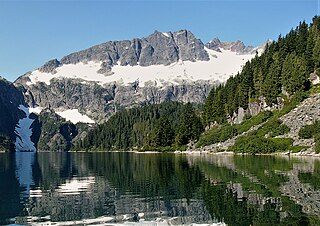
Lydia Mountain is a 2,100-metre (6,890-foot) summit located in the Tantalus Range, in Tantalus Provincial Park, in southwestern British Columbia, Canada. It is situated 14.5 km (9 mi) northwest of Squamish, and 5.46 km (3 mi) south-southeast of Mount Tantalus, which is the highest peak in the Tantalus Range. The nearest higher neighbor is The Red Tusk, 0.5 km (0 mi) to the west, and Mount Niobe lies 2.17 km (1 mi) to the east-southeast. Lake Lovely Water lies below the eastern slope of the peak and precipitation runoff from the peak drains east to the Squamish River, and west to the Clowhom River via Red Tusk Creek. Topographic relief is significant as Lydia Mountain rises 1,400 meters (4,600 feet) above Red Tusk Creek in approximately three kilometers (two miles). The mountain's name was officially adopted on June 6, 1957, by the Geographical Names Board of Canada. The mountain was named for mythic Lydia, of which Tantalus was a primordial ruler in Greek mythology. Several peaks in the Tantalus Range are named in association with Tantalus. The first ascent of Lydia Mountain was made in 1914 by Basil Darling and Allan Morkill.
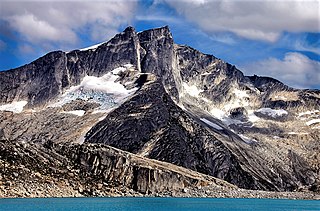
Big Snow Mountain is a 2,357-metre (7,733-foot) mountain summit located in British Columbia, Canada.
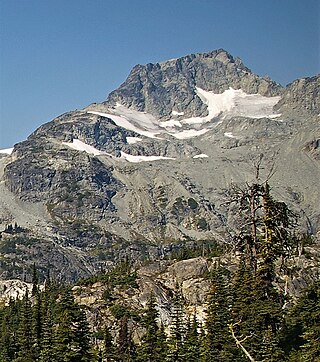
Face Mountain is a 2,485-metre (8,153-foot) mountain summit located in British Columbia, Canada.

Ipsoot Mountain is a 2,576-metre (8,451-foot) glaciated summit located in southwest British Columbia, Canada.

Antimony Mountain is a 2,668-metre (8,753-foot) mountain summit located in British Columbia, Canada.

Claimpost Peak is a 2,671-metre (8,763-foot) mountain summit located in British Columbia, Canada.
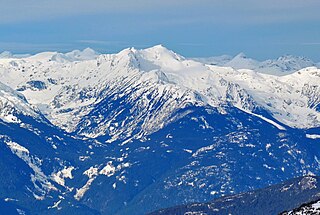
Rhododendron Mountain is a 2,523-metre (8,278-foot) glaciated summit in British Columbia, Canada.

Cloudraker Mountain is a 2,385-metre (7,825-foot) glaciated summit in British Columbia, Canada.

Mount Sir Richard is a 2,681-metre (8,796-foot) glaciated summit in British Columbia, Canada.

Outlier Peak is a 2,422-metre (7,946-foot) mountain summit in British Columbia, Canada.

Nivalis Mountain is a 2,659-metre (8,724-foot) mountain summit in British Columbia, Canada.

Mount Neal is a 2,552-metre (8,373-foot) glaciated summit in British Columbia, Canada.
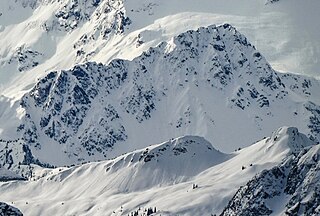
Carcajou Peak is a 2,239-metre (7,346-foot) mountain summit in British Columbia, Canada.

Twin Goat Mountain is a 2,128-metre (6,982-foot) summit in British Columbia, Canada.

Shudder Mountain is a 2,671-metre (8,763-foot) summit in British Columbia, Canada.

Amicus Mountain is a 2,510-metre (8,235-foot) glaciated summit in British Columbia, Canada.

Klowa Mountain is a 2,527-metre (8,291-foot) summit in British Columbia, Canada.

Tzoonie Mountain is a 2,123-metre (6,965-foot) summit in British Columbia, Canada.

Mount Pitt is a 2,487-metre (8,159-foot) summit in British Columbia, Canada.






















